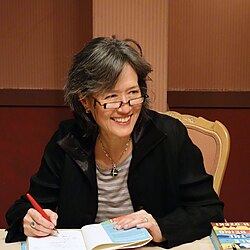Ruth Ozeki Quote
Time interacts with attention in funny ways.At one extreme, when Ruth was gripped by the compulsive mania and hyperfocus of an Internet search, the hours seemed to aggregate and swell like a wave, swallowing huge chunks of her day.At the other extreme, when her attention was disengaged and fractured, she experienced time at its most granular, wherein moments hung around like particles, diffused and suspended in standing water.There used to be a middle way, too, when her attention was focused but vast, and time felt like a limpid pool, ringed by sunlit ferns. An underground spring fed the pool from deep below, creating a gentle current of words that bubbled up, while on the surface, breezes shimmered and played.
Time interacts with attention in funny ways.At one extreme, when Ruth was gripped by the compulsive mania and hyperfocus of an Internet search, the hours seemed to aggregate and swell like a wave, swallowing huge chunks of her day.At the other extreme, when her attention was disengaged and fractured, she experienced time at its most granular, wherein moments hung around like particles, diffused and suspended in standing water.There used to be a middle way, too, when her attention was focused but vast, and time felt like a limpid pool, ringed by sunlit ferns. An underground spring fed the pool from deep below, creating a gentle current of words that bubbled up, while on the surface, breezes shimmered and played.
Related Quotes
People lack morals, good moral character is important in every aspect of your life. Honesty and Integrity opens the door. Your character allows others to see you for who you truly are. Make your first...
About Ruth Ozeki
